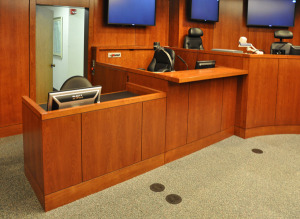By: Carson Smith
Today, in United States v. Mormon, an unpublished opinion, the Fourth Circuit affirmed the district court’s conviction of defendant, Kevin Mormon. The District of Maryland convicted the defendant of “conspiracy to distribute and possess with intent to distribute 280 grams or more of cocaine base, in violation of 21 U.S.C. § 846.” On appeal, Mormon challenged the district court’s denial of his motion to suppress, admission of statements made by a co-conspirator, and failure to grant his motion for mistrial based on improper remarks made by the Government during closing arguments.
The District Court’s Denial of Mormon’s Motion to Suppress Was Proper Because His Statements Were Voluntary.
Mormon argued that the district court erred by refusing to suppress statements made by Mormon to law enforcement officers. In assessing a motion to suppress, appellate courts review legal conclusions de novo and factual findings for clear error.
The Fourth Circuit concluded that the statements made by Mormon to the officers were voluntary. Under Miranda v. Arizona, any statement extracted from a defendant through threats of violence, direct or implied promises, or improper influence is involuntary and thus inadmissible in court. Essentially, “the proper inquiry is whether the defendant’s will has been overborne or his capacity for self-determination critically impaired.” While Mormon claimed that the statements were only made after the officers promised to release him in exchange for his cooperation, the Fourth Circuit determined that the officers did not explicitly promise him anything in exchange for his cooperation. Furthermore, the Fourth Circuit found it persuasive that Mormon had refused to reveal his cocaine distributor until an attorney was present. This illustrated his ability to understand his rights and maintain willpower during the incident. Accordingly, the Fourth Circuit affirmed the district court’s denial of the motion to suppress.
The District Court Did Not Abuse Its Discretion by Admitting Statements of Co-Conspirator.
Mormon claimed that the district court incorrectly admitted statements made by a co-conspirator on a video recording. Mormon argued that the recording was not properly authenticated and the statements violated the hearsay rule and Confrontation Clause. Appellate courts review the admissibility of evidence for abuse of discretion.
The Fourth Circuit concluded that the video recording was properly authenticated and the statements properly admitted. In order to properly authenticate a piece of evidence, the government must only show on its face, prima facie, that the evidence is authentic. The Fourth Circuit determined that the Government “provided an adequate foundation to show that the recording was what the Government said it was” and thus satisfied their burden. In addition, the statements made by the co-conspirator were admissible under the co-conspirator exception to the hearsay rule. Finally, the statements did not violate the Confrontation Clause because they were not testimonial. Therefore, the court affirmed the district court’s admission of the co-conspirator statements.
Improper Statements by the Government During Closing Argument Did Not Deprive Mormon of a Fair Trial.
Mormon claimed that the district court should have granted his motion for a mistrial because of improper remarks made by the Government during closing argument. A motion for mistrial is reviewed for abuse of discretion.
The Fourth Circuit concluded that the remarks made by the Government did not warrant a mistrial. In order for a court to grant a mistrial, the defendant must prove that the Government made improper remarks during the closing argument which “prejudicially affected [the defendant’s] substantial rights so as to deprive him of a fair trial.” Even though the Government conceded that the remarks were improper, the Fourth Circuit determined that they did not rise to the level of prejudicial. Not only were the remarks “a brief, isolated episode,” but the Government’s case was persuasive even without the remarks. Accordingly, the Fourth Circuit affirmed the district court’s denial of Mormon’s motion for a mistrial.
District Court Judgment Affirmed.
The Fourth Circuit affirmed the district court’s ruling on each of the three issues raised by Mormon on appeal.

